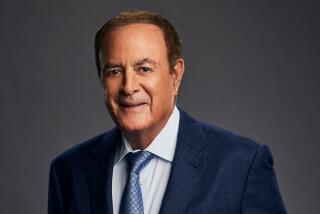TALKING BACK TO THE TELLY IN LONDON
- Share via
London bridges. . . .
Thick-lidded Harold Macmillan, Britain’s prime minister from 1957 to 1963, was also an astute television critic. TV, he once said, “is a 20th-Century torture chamber.”
In Britain, at least, the tormented can confront their tormentors.
Both non-commercial BBC channels and commercial TV have a history of public accountability, such as turning the other cheek and allowing viewers to unload on them via letters read on the air. Now BBC-1 has gone even further.
The new hourlong, weekday-morning program is “Open Air,” and of everything on British TV, it is the idea most worth copying by U.S. networks and stations.
Everybody wins. It’s therapeutic for viewers and self-serving for the BBC. People love to knock the media and watch others knock the media. Moreover, frank admissions of error gain more respect than lame excuses. Even better, some minds may be changed on both sides.
“Open Air” is part of a 3-week-old upgrading of BBC-1 daytime programming whose other new elements are more traditional and less exciting. Each morning at 11:30, BBC producers and other executives in London are questioned--and sometimes angrily confronted--by viewers in the BBC’s Manchester studios and also by callers.
The BBC moderators play it straight--right down the middle without favoring their bosses or other colleagues.
On one segment I saw during a recent London trip, BBC news chief Ron Neil nervously outlined the BBC’s detailed rebuttal of a Conservative Party attack on “Beeb” newscasts. The questioners did not tread lightly.
On another segment, BBC television managing director Bill Cotton was lauded and blasted for not including reruns of an old black minstrel series in the BBC’s on-air celebration of its 50th birthday.
Cotton politely argued that whites in blackface were offensive today. Appallingly racist is more like it.
He was immediately reproached in Manchester by a white woman and also by the white man who starred in the old series. Cotton was supported by a black man in the studio. The raw antagonisms between black and white in Manchester were a revealing and disturbing mini-study in race relations.
Cotton didn’t back down, but he was not defensive or abusive, and this time it was viewers who got the last word--a rarity for TV.
Oh, there were also trivial segments--viewers irked about a soap-opera wedding not showing them the bride’s entire dress, for example. So, voila, filling the screen, there it was.
But the “On Air” potential for straight talk between TV maker and TV viewer is enormous.
“It is a risky concept if you believe what you’re doing doesn’t stand scrutiny,” said Roger Laughton, the BBC’s daytime programming chief. “But if you believe it does, it’s not risky.”
That’s a healthy attitude that U.S. broadcasters should heed.
I saw something similar to “Open Air” briefly tried at a station in Louisville, Ky., a decade ago. There was to be a weekly program on which the station manager was to candidly answer viewers’ written questions. The premiere was such a dishonest sham and attempt to shine the station’s image, though, that it was blasted by critics, and it immediately disappeared.
“Yes, the real risk of ‘Open Air’ is that it could look like a platform for BBC propaganda,” Laughton acknowledged.
Another is that it could become a stage for organized anti-BBC propagandists instead of ordinary citizens. Another is that this is merely lip service with no one on the BBC side really listening to the public. And still another is that after the initial excitement, BBC executives will tire of being publicly harangued and will become unavailable.
That would be a mistake, for public accountability is a glorious ideal that, extreme as it sounds, is appropriate even in the U.S.
BRITISH NEWSCASTS are being increasingly faulted for high-profile anchors a la the United States.
What a laugh. Compared with ours, most British anchors are pastel, and that’s refreshing. There is no driveling forced chat, for example, and anchors speak to viewers, not themselves. The BBC’s Nicholas Witchell wouldn’t start a story by saying to his co-anchor, Sue Lawley: “You know, Sue, two men were found murdered. . . .”
Anchor salaries are less glittering in Britain, too. A top national anchor gets about $90,000 maximum, which is what Dan Rather spends on lunch. The local news anchor for commercial Ulster Television in Belfast, Ireland--serving a six-county market of 1.5 million--is paid $25,000. His counterpart in a similar-sized U.S. market would make at least $200,000.
Most of Britain’s national anchors are merely news readers, though, and when they get out of the business, they get far out. Former BBC morning-show anchor Selina Scott now has a daytime program on clothes. And Angela Rippon--once the most toasted anchor in the realm and so big that she had a brief anchor fling in the United States--is now a game-show host.
I’ll try movie stars for 25 pounds, Angela.
NATIONAL FOOTBALL LEAGUE highlights--a weekly staple on commercial Channel Four since 1982--are gaining popularity throughout Britain. Those macho helmets and pads have caught on so much that Britons are now playing in organized American football leagues of their own.
I was in a Belfast pub with three Irishmen recently. Were they discussing Catholic/Protestant tensions? The price of beer? Margaret Thatcher?
Of course not. They were talking about the Chicago Bears’ Refrigerator Perry.
More to Read
The complete guide to home viewing
Get Screen Gab for everything about the TV shows and streaming movies everyone’s talking about.
You may occasionally receive promotional content from the Los Angeles Times.






